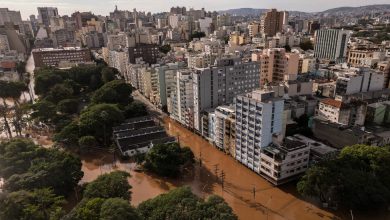Your Thursday Briefing: Biden Vows Not to “Waver” After NATO Summit


President Volodymyr Zelensky and President Biden met yesterday.Credit…Doug Mills/The New York Times
‘We will not waver,’ Biden says after the NATO summit
President Biden concluded the meeting of NATO allies by comparing the battle to expel Russia from Ukraine with the Cold War struggle for freedom in Europe. “We will not waver,” he promised in a speech.
Biden seemed to be preparing Americans and the allies for a confrontation that could go on for years. He cast the war, which has been going on for almost a year and a half, as a test of wills with President Vladimir Putin of Russia, who is intent on fighting. Biden insisted that NATO’s unity would hold.
“Putin still wrongly believes he can outlast Ukraine,” Biden said, describing the Russian leader as a man who made a huge strategic mistake in invading a neighboring country. “After all this time, Putin still doubts our staying power. He is making a bad bet.”
Ukraine: The alliance has formed a new council intended to give Ukraine an equal voice on issues related to its security alongside member states.
China: Beijing criticized a NATO statement that accused it of a military expansion that threatens the West, saying that the alliance was still stuck in a Cold War mentality.
Uncertainty in Russia’s top ranks: Gen. Sergei Surovikin, once a Wagner ally, hasn’t been seen publicly since the mutiny last month. A top lawmaker said he was “taking a rest.”
Another top commander was killed in an airstrike in Ukraine. And a third former commander was gunned down while out on a jog.
Chinese hackers targeted the U.S. State Department
Chinese hackers targeted specific State Department email accounts in the weeks before Secretary of State Antony Blinken traveled to China last month, U.S. officials said.
The hack, which went undetected for a month, comes at a time of heightened diplomatic tensions between the countries. “The Biden administration is trying to reset relations with Beijing,” Julian Barnes, who covers national security for The Times, told me. “The U.S. does not want that dialogue to end. So there is an interest in downplaying this.”
No classified email or cloud systems were said to have been breached, and the hack did not initially appear to be directly related to Blinken’s trip. Still, the attack was sophisticated.
The hackers targeted specific accounts, instead of carrying out a broad-brush intrusion, which Chinese hackers are suspected of having done before. U.S. officials did not identify which accounts were targeted. The breach revealed a significant security gap in Microsoft’s cloud, where the U.S. government has been transferring data from internal servers.
“We’ve had all these promises that the cloud is not only going to be just as secure, but that it will be more secure,” Julian said. “But here’s an example where basic security was breached and the information was stolen. That has opened us up to a new avenue of attack: Here is the first big cloud attack on the U.S. government email.”
Tech: The Biden administration thinks it can slow China’s economic growth and its A.I. industry by cutting it off from semiconductor chips. The plan could handicap China for a generation, but if it backfires it could hasten the very future the U.S. wants to avoid.
An ocean heat wave threatens marine life
The water surrounding Florida is much hotter than most swimming pools in the U.S. are right now. This could pose a severe risk to coral and marine life in the Gulf of Mexico and the Atlantic. But the real worry is that it’s only July: Corals usually experience the most heat stress in August and September.
The maritime heat wave has pushed water temperatures into the 90s Fahrenheit, or above 32 Celsius. Surface temperatures in these waters are the hottest on record; some beachgoers in Florida even compared the ocean to bath water.
The science: When the sea gets too hot, corals bleach, expelling the algae they eat. If waters don’t cool quickly enough, or if bleaching events happen in close succession, the corals die. That can lead to ripple effects across the ecosystem.
THE LATEST NEWS
Around the World
-
President Mahmoud Abbas of the Palestinian Authority visited Jenin, the West Bank city targeted by Israeli raids last week, in a show of authority.
-
U.S. inflation cooled in June, offering good news for consumers and the Federal Reserve.
-
Black women in Latin America are more likely to die during pregnancy or childbirth because of systemic medical racism and sexism, a U.N. report said.
-
“Succession” got the most nominations for the Emmy Awards.
Other Big Stories
-
A former Mozambican official accused in the $2 billion “tuna” scandal, a scheme that defrauded U.S. investors, was extradited to New York.
-
The BBC staff member suspended on allegations of sexual misconduct was identified by his wife as Huw Edwards, an anchor on the network’s flagship nightly news program.
-
International demand for drugs has unleashed a wave of violence in Ecuador that is unlike anything in the country’s recent history.
-
Snow fell in Johannesburg for the first time in more than a decade.
A Morning Read
Buchung Sonam fled Tibet in the 1980s. Later, he co-founded a publishing house for Tibetan writing, hoping literature could be a salve for other exiles.
As Beijing tightens its crackdown on Tibet, detaining writers and intellectuals, many say Sonam’s press is helping Tibet’s literature become a proxy for the nation-state.
“It’s not like I can live my life on Tibetan land,” said Tenzin Dickie, a writer and editor, “but I can live it in Tibetan literature.”
ARTS AND IDEAS
Milan Kundera dies at 94
“It’s hard to overstate how central Milan Kundera was, in the mid-1980s, to literary culture in America and elsewhere,” my colleague Dwight Garner writes in an appraisal of Kundera’s life.
Kundera, who died in Paris this week at 94, wrote mordant, sexually charged novels that captured the suffocating absurdity of life. “The Unbearable Lightness of Being,” which was adapted into a film, is his most famous book.
“He was the best-known Czech writer since Kafka,” Dwight continued, “and his fiction brought news of sophisticated Eastern European societies trembling under the threat of Soviet repression.”
PLAY, WATCH, EAT
What to Cook
Mix this Thai-style vegetable salad.
What to Watch
In “Amanda,” a dark Italian comedy, a delusional graduate befriends an agoraphobic misanthrope.
Fashion
More men are baring their midriffs in crop tops.
Tech Tip
How does Meta’s Threads stack up against Twitter? Read our review.
Now Time to Play
Fill in the Mini Crossword, and a clue: Broke ground in a garden (four letters).
Here are the Wordle and the Spelling Bee. You can find all our puzzles here.
That’s it for today’s briefing. See you tomorrow! — Amelia
P.S. Alice Callahan will be our new nutrition reporter.
“The Daily” is on the U.S. labor market.
We’d love to hear from you. Write: [email protected].




